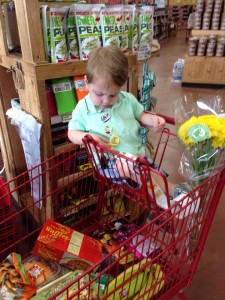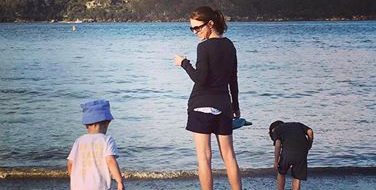 The Kid sits still for circle time now.
The Kid sits still for circle time now.
He does, however, have “trouble with transitions” according to his well-meaning teachers–which is really just a nice way of saying that he doesn’t like to be told what to do. When I asked about things we could be working on at home, and they provided this information, I had to laugh to myself. No kidding. Because, you know, he’s two, and, you know, his mom is thirty-seven, and we’re both going to need some time.
“I wonder where he gets that temper,” The Husband nudged me playfully one weekend when TK pitched a fit over being “transitioned” from playing on the floor to washing his hands for dinner. And it’s both funny and poignantly real, how painful it can be for us to be moved. And how, really, this is what life is.
We’re in the quiet weeks now: the laundry is done, the gear is set up, the car seats installed, and we’re waiting. My nurse will ring the doorbell one last time next week and administer my last progesterone shot, the medication designed to keep things static in there, and though a date has been set–plans in pencil!–who really knows when our family of three will give way to four, a new cry sounding through our nights and our lives taking on a different shape. I feel myself clinging to what I know, holding TK tighter as he stacks blocks on my belly, sitting beside him and smelling his head in the glider where I will rock his brother. This event brings everything, all rolled up within it: excitement over meeting him for the first time, guilt over sharing my heart, dread over sleeplessness and zombification, even a strange resentment over something we prayed and ached for finally happening.
I think TK and I are going to have to learn to deal with change.
When we saw the occupational therapist and found out what wasn’t wrong, we also learned about some things that are going on. The sensitivities that TK carries around with him (you’re welcome, kid). The proclivity he has for familiarity, something explained not by a spectrum or a syndrome but by actual anatomy: this is the way his brain works. All the studying and reading, the internet-provided, self-guided refresher courses on cerebellar function and motor planning and cortical divisions, the plunging of myself into his skull as he plunges his way through my heart, and the end of it all–or, more accurately, the now of it all–is, like T.S. Eliot said, “to arrive where we started and know the place for the first time.” Which is to say, he was made this way. Designed. He avoids, then approaches, then warms up, then knows. He learns in his own way. (I bet Einstein did too, I think to myself.) And instead of the god of conformity that I grew up idolizing, I see the beauty of intended uniqueness, the endless possibilities all this could be fitting him for, and something inside me snaps as I stop being afraid of it and begin to embrace it. Love it.
He played with a toy this week as I talked to his speech therapist and voiced it aloud, what it means to be his advocate: how other people will misunderstand and assume, including the well-meaning cashier at Trader Joe’s who hugged him, gave him stickers, then told me her sister is “like that” and I realized she was assigning, kindly, a label to him that actually doesn’t apply. That this will probably occur often at least until he speaks, and maybe past then–I remember an eighth-grade teacher of mine asking if something was wrong with me because I stared into space (hindsight reveals she was probably hungry and in need of a cigarette. Also, she was an ass). Some people do that–they stare off into space because they see something beyond. And I’ll be damned if I try to train that out of him.
I love that we have a pastor who talks about Alabama football in one breath, and Maslow’s Hierarchy of Needs in the next, and I love how that little triangle sandwiches love and belonging right in the middle. How the need for a home is ingrained in us, how we have got to fit in somewhere. I love how faith, how the seeing more, is the only system that reflects design–and that design is the only way to fully explain these nuances that make us each who we are, that constitute a fitting and a calling and a belonging to something bigger than just us. I love that in the narrative of faith, life is an exodus: a journey home even as we have home with us, so that we’re always headed somewhere even as we know this place for the first time. I love that there is bread and wine for that journey, the holy enough being put into our hands every moment, the perceptible and imperceptible changes that make us who we are and take us where we’re going.
I love that being his mother is making me embrace TK for all he is while teaching me to be myself, setting us both free as we walk a life that is one change after another, held by a love that is perfectly changeless.

One comment on “Transitions”
I Still don’t like being told what to do. Never have and never will. Much to the dismay of my husband. And his chagrin. I learned to accomodate but as I’ve gotten older, I’ve become less inclined to accomodate.
Think of you often.